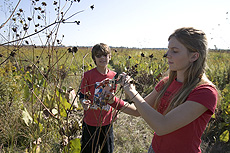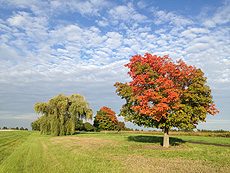|
Have a safe day!
Monday, Sept. 29
2 p.m.
Particle Astrophysics Seminar - Curia II
Speaker: Markus Ahlers, University of Wisconsin, Madison
Title: The IceCube Puzzle
3:30 p.m.
DIRECTOR'S COFFEE BREAK - 2nd Flr X-Over
THERE WILL BE NO ALL EXPERIMENTERS' MEETING THIS WEEK
Tuesday, Sept. 30
3:30 p.m.
DIRECTOR'S COFFEE BREAK - 2nd Flr X-Over
4 p.m.
Accelerator Physics and Technology Seminar - One West
Speaker: Timofey Zolkin, University of Chicago
Title: Horizontal Head-Tail Modes for Fermilab Booster
Visit the labwide calendar to view Fermilab events
|
|
Monday, Sept. 29
- Breakfast: pancake sandwich
- Breakfast: sausage, egg and cheese croissant
- Philly chicken sandwich
- Pork tenderloin with raspberry sauce
- Corned beef and cabbage
- Filipino chicken adobo
- Szechuan-style green beans with chicken
- Minestrone
- Texas-style chili
- Assorted pizza by the slice
Wilson Hall Cafe menu
|
|
Wednesday, Oct. 1
Dinner
- Grilled tilapia
- Smoked paprika and parmesan polenta
- Sauteed green beans
- Walnut tart
Friday, Oct. 3
Dinner
Closed
Chez Leon menu
Call x3524 to make your reservation.
|
|
Two chances for green thumbs at
Fermilab's Prairie Seed Harvest on Oct. 4 and Nov. 1
 |
| Volunteer to diversify native plant species on the Fermilab site at the annual Prairie Seed Harvest.
Photo: Reidar Hahn |
Calling all nature lovers. How would you like the chance to help diversify one of the oldest prairie restorations in Illinois?
The U.S. Department of Energy's Fermi National Accelerator Laboratory is looking for volunteers to help with its annual Prairie Seed Harvest. Two harvest events are planned, on Saturday, Oct. 4, and Saturday, Nov. 1, beginning at 10 a.m. Fermilab's site hosts 1,000 acres of restored native prairie land, and each year community members pitch in to help collect seeds from those native plants.
Less than one-tenth of one percent of native prairies in Illinois remains intact. Fermilab's restored grassland is one of the largest prairies in the state. The deep-rooted natural grasses of the prairie help prevent erosion and preserve the area's aquifers.
The main collection area encompasses about 100 acres, and within it, volunteers will gather seeds from about 25 different types of native plants. Some of those seeds will be used to replenish the Fermilab prairies, filling in gaps where some species are more dominant than others.
"Our objective is to collect seeds from dozens of species," said Ryan Campbell, an ecologist at Fermilab. "We have more than 1,000 acres of restored grassland, and it's not all of the same quality. We want to spread diversity throughout the whole site."
Once the seeds have been collected, the Fermilab Roads and Grounds staff will store them in a greenhouse and process them for springtime planting, after controlled burns of the prairie have been conducted. The laboratory has donated some of the seeds to area schools for use in their own prairies and as educational tools.
Fermilab has been hosting the Prairie Seed Harvest every year since 1974, and it typically draws more than 200 volunteers. Both of this year's events will last from 10 a.m. to 2 p.m., with lunch provided. Volunteers will be trained on different types of plants and how to harvest seeds. If you have them, bring gloves, a pair of hand clippers and paper grocery bags.
Read more
|
Autumn is coming
 |
| Leaves are starting to glow orange on the trees on Batavia Road. Photo: Erik Ramberg, PPD |
|
Science Next Door October newsletter now online
The October edition of "Science Next Door," Fermilab's monthly community newsletter, is now available online. View it or subscribe to get the latest about the laboratory's public events, including tours, lectures, arts events and volunteer opportunities.
|
Six decades of science for peace
From CERN Courier, Sept. 23, 2014
CERN's origins can be traced back to the late 1940s, when a divided Europe was emerging from the ashes of war. A small group of visionary scientists and public administrators, on both sides of the Atlantic, identified fundamental research as a potential vehicle to rebuild the continent and foster peace in a troubled region. It was from these ideas that CERN was born on 29 September 1954, with a dual mandate to provide excellent science, and to bring nations together. Twelve founding member states — Belgium, Denmark, France, the Federal Republic of Germany, Greece, Italy, the Netherlands, Norway, Sweden, Switzerland, the UK and Yugoslavia – signed the convention that officially entered into force 60 years ago.
As CERN's facilities and research arena grew in size, so too did the extent of collaboration, with more countries becoming involved — in particular with the programme for the Large Electron–Positron (LEP) collider, and more recently with the construction of the Large Hadron Collider (LHC) itself, as well as its experiments. Today, CERN has 21 member states, with one candidate for accession, one associate member in the pre-stage to membership and seven observer states and organizations. In addition, it has co-operation agreements with many non-member states.
[This CERN Courier] timeline illustrates a few key moments in this collaborative journey, from those early days to 2014, the 60th anniversary year.
Read more
|
|
Preventing the spread of influenza
As fall approaches, thoughts of protecting oneself from influenza, or the flu, come to mind. The flu is a viral infection that is spread through air in droplets when someone with the infection coughs, sneezes or talks. Typically, influenza viruses circulate in the United States from late fall through early spring.
The Centers for Disease Control and Prevention continue to recommend an annual influenza vaccine for all persons older than six months and who have no contraindication to the vaccine or its components. In October, Fermilab will offer employees Novartis' Flucelvax vaccine, which is administered by injection into the muscle of your upper arm. Information pertaining to the upcoming flu vaccine clinic will available on the ESH&Q and Medical Office websites on Oct. 6.
Flucelvax is an inactivated, cell culture-derived influenza virus vaccine that is indicated for active immunization of persons 18 years of age and older. It protects from the three influenza viruses that are expected to be the most common during this year's flu season:
- A/Brisbane/10/2010 (H1N1), derived from an A/California/7/2009 (H1N1)-like virus
- A/Texas/50/2012 (H3N2)-like virus
- B/Massachusetts/2/2012-like (Yamagata lineage) virus
This particular vaccine contains no preservatives or antibiotics. There is an extremely small amount of egg protein in Flucelvax. The Centers for Disease Control provides a flow chart (scroll to bottom of the page) detailing recommendations for influenza vaccination of persons who report allergy to eggs. However, it should not be administered to patients with a history of severe allergic reaction to any component of the vaccine, including egg protein.
One concern for those sensitive to latex is the possibility of natural rubber latex being present in the cap of the syringe. There is also a concern for those for whom Guillian-Barre syndrome has occurred within six weeks of receipts of a prior influenza vaccine. It is recommended that these individuals seek immunization from their primary physician or allergist.
Influenza vaccine is generally well tolerated. The most common adverse events occurring in adults within seven days of vaccination were pain and erythema at the injection site, headache, fatigue, myalgia and malaise.
To prevent the spread of influenza, wash your hands thoroughly and frequently, ideally with soap and water by scrubbing your hands vigorously for at least 15 seconds, or use alcohol-based hand sanitizers. Cough into a tissue or the inner crook of your elbow to avoid contaminating your hands. When possible, avoid crowds where infections can spread easily, drink plenty of water, and avoid touching your mouth, nose and eyes with your hands.
Let's make every effort to avoid the flu this year!
—Caroline F. Hetfield, ANP-BC, Fermilab Medical Office
|
New employees - September
The following regular employees started at Fermilab in September:
Rich Eckert, CCD; Yun He, TD; Yuenian Huang, TD; John Kearney, PPD; Ornella Palamara, PPD; Aaron Sauers, OPTT; Kelley Trombly-Freytag, TD; Cary Yoshikawa, PPD.
Fermilab welcomes them to the laboratory.
|
|